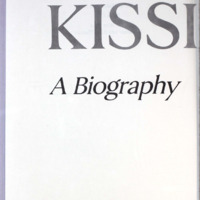-
Title
-
Kissinger : a biography
-
Description
-
Walter Isaacson's biographical work on former Secretary of State, Henry Kissinger.
-
Identifier
-
409948
-
671663232
-
Creator
-
Isaacson, Walter
-
Source
-
Brian Lamb Booknotes Collection
-
Gift of Brian Lamb, 2011.
-
Catalog record
-
Language
-
eng
-
Date
-
1992
-
Program air date: September 27, 1992.
-
Publisher
-
Simon & Schuster
-
George Mason University. Libraries. Special Collections & Archives
-
Subject
-
"Kissinger, Henry, 1923-"
-
"Statesmen--United States--Biography."
-
"Historians--United States--Biography."
-
Relation
-
Original Booknotes interview
-
Rights
-
This work may be protected by copyright laws and is provided for educational and research purposes only. Any infringing use may be subject to disciplinary action and/or civil or criminal liability as provided by law. If you believe that you are the rights-holder and object to Mason’s use of this image, please contact speccoll@gmu.edu.
-
Text
-
Transcription of Annotations
Notes on front endpapers: Council on Foreign Relations, Trilateral Commission, Bilderberg, Metropolitan Club, Bohemian Club. Underlinings/notes: Will it be favorable or unfavorable? Unauthorized biography; Kissinger did not approve/see contents prior to publication, no authority over book. Fully cooperated, more than 24 formal interviews. Helped track adversaries. Kissinger--instinctive feel for power, for creating a new global balance that could help America cope with its post Vietnam withdrawal system. "Point of departure is order, which alone can produce freedom"--Metternich. Kissinger--philosophically, intellectually, politically--conservative. Harvard--senior thesis, 383 pages, longer than any previous undergraduate thesis. Spengler, Kant, Metternich, Bismark--4 Europeans who fascinated him. Personality--arrogant/abrasive even by Harvard's standards. Bundy, dean of faculty, had funding from Ford Foundation for two new "half" chairs--tailored it for Kissinger. Started with Napoleon, Metternich and Bismark. Kissinger article published in Daedalus, 1968. Bismark's assertion that foreign policy had to be based not on sentiment, but strength; one of Kissinger's guiding principles. Maxine makes me want to commit murder; Sally makes me want to commit suicide--Kissinger on Maxine Cheshire/Sally Quinn. Watergate wiretaps--most questions and stories came from White House reporters/investigative reporters. Called Nixon Mr. President at all times. Last Nixon meeting was to discuss his resignation--Kissinger would resign if Nixon was tried. Meeting was to discuss Kissinger's resignation rather than Nixon's. Oddest man he ever met. Freeport-McMoRan. $200,000 annual retainer, $500,000 month in fees. Trust Company of the West. Kissinger Associates--active business in July 1982. Would never lobby the US government on behalf of any client, waited five years . $350,000 loan. Annual revenue $5 million by 1987, doubled by 1990s. Brent Scowcroft, Lawrence Eagleburger. Eagleburger made $647,000 in salary, $240,000 in severance and other payments. L. Paul "Jerry" Bremer, William D. Rogers. By 1990s more than two dozen corp. clients--closely guarded secret. Annual retainer in 1990s, $200,000 with specific projects costing $100,000/month plus expenses. H.J. Heinz, Anthony Reilly, Robert Day, James Robinson, Maurice Greenberg, James Moffett. 60 Minutes--issues with Hewitt. Kent Associates. James "Rocky" Johnson, chairman of GTE. Wherever Henry goes, everyone wants to meet him--he's larger than life, its like traveling with someone who is still a secretary of state. Oscar de la Renta. Giovanni Agnelli. Lee Kuan Yew of Singapore, close personal friend of Kissinger, Mahathir Bin Mohamad, Prime Minister of Malaysia, former student of Kissinger. Freeport-McMoRan--$200,000 retainer, $600,000 in fees. Boards--American Express, R.H. Macy, Hollinger, Union Pacific, Continental Grain, CBS, Revlon, Freeport-McMoRan, Trust Company of the West. $2 million from speaking; annual income $8 million. Nothing Kissinger did as consultant was illegal, nor did it skirt the edge of the law. Potential conflict of interest. Plug for Robinson. Tiananmen Square--ABC News. Shocked by brutality--internal matter, Deng, a real reformer. Helped Atlantic Richfield negotiate a deal to market oil it had discovered in China. ITT, H.J. Heinz. China Ventures--Kissinger chairman, chief executive, general partner. Never got off the ground. When asked about conflict on McNeil/Lehrer News Hour--claimed it outrageous to insinuate that personal financial considerations had prompted him to defend the Chinese regime. 1989 15th trip to China. Peter Jennings later said that if he had known then what he now knew, he would not have wanted Kissinger on the broadcast the day after Tiananmen. Parties--Swifty Lazar. Laurence Tisch., Tom Johnson, Kirk and Ann Douglas, Milos Forman, David and Susan Brinkley, Tom and Meredith Brokaw, Abe and Shirley Rosenthal, Henry and Louise Grunwald, William and Pat Buckley, Pete Peterson, Joan Ganz Cooney. Elizabeth Kissinger went to medical school and became a doctor in the Boston area. David became a lawyer at a Manhattan firm. Not clubby, but Bohemian Grove, Bilderberg Group. Bohemian Grove members: presidents Bush, Reagan, Ford and Nixon. Kissinger's club, Mandalay, included Ford, George Shultz, Nicholas Brady, Thomas Watson, Jr. Kissinger cut in line at the telephones to bring prime minister of France, Michel Rocard, as his guest. Bilderberg group--serious, secretive. Founded mid 1950s by Prince Bernhard of the Netherlands, George Ball, Joseph Retinger, John Coleman. 80+ leaders of Atlantic Alliance nations/captains of industry--3 day conclave. Made stab at winning over Garry Trudeau. 1990s Kissinger's world more full of show than substance. Fly the world in private planes playing diplomat/foreign adviser. 1991 Paula Kissinger turned 90--Kissinger told her that it was she held them together through courage, spirit, devotion--everything achieved by him or the family, was due to her. Kissinger's philosophy of international affairs--power-oriented realism/realpolitik was rooted in his background. Power rather than righteousness determined world order. Arrogant, paranoid, conspiratorial, vain. Realpolitik ill-suited to open/democratic society. US triumph in cold war, not competition for military power/influence, it was values --foreign policy that drew strength from ideals of its people. Extensive underlinings in bibliography. 150 people interviewed; only five insisted on anonymity.
 409948.pdf
409948.pdf